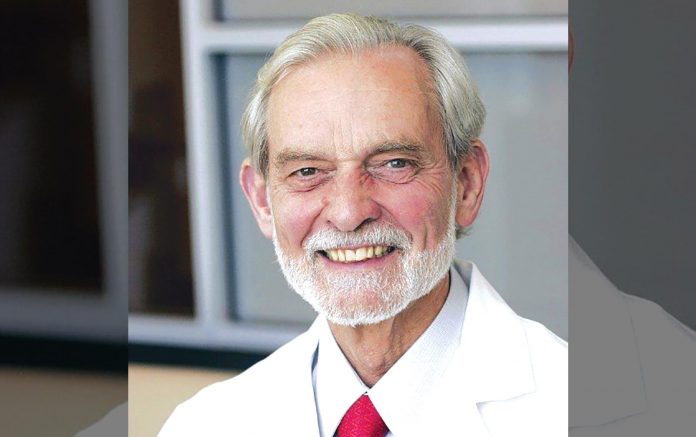Posted: October 2018
James D. Cox, MD, a leader in the radiation oncology community and pioneer of proton therapy, passed away in August, just a month after his 80th birthday. Dr. Cox’s career path was peppered with illustrious mentors, directorships, society accolades, hundreds of peer-reviewed article publications, and an editorship of almost 2 decades.
A native of Dayton, Ohio, Dr. Cox obtained his undergraduate degree from Kenyon College in Gambier, Ohio, and his medical degree from the University of Rochester Medical School. Dr. Cox spent his residency and a year of fellowship at Gustave Roussy, France, to study with Bernard Pierquin, MD, the king of brachytherapy, and other giants in the world of radiation oncology, including Andrée Dutreix, PhD, Maurice Tubiana, MD, PhD, and Daniel Chassagne, MD. Dr. Cox went on active duty in the U.S. Army upon his return from overseas and was stationed at Walter Reed Army Institute of Research from 1970 to 1972. When his commanding officer and head of the department of radiology at Walter Reed, John G. Maier, MD, retired, Dr. Cox became the head of the radiotherapy service there “by default” in his second year. Shortly after, at the age of 34, Dr. Cox became the head of the radiotherapy section in the department of radiology at Georgetown University.
From there Dr. Cox took directorships with the Medical College of Wisconsin and Columbia University before becoming physician-in-chief at The University of Texas MD Anderson Cancer Center (MDACC) in 1988. During that time, he also chaired the Radiation Therapy Oncology Group (RTOG), where he oversaw the completion of several important randomized trials in carcinomas of the prostate and esophagus, as well as lung cancer, many of which were practice-changing at the time.
Dr. Cox stepped down as physician-in-chief in 1992. In 1995, he became chairman of the department of radiation oncology and head of the division of radiation oncology at MDACC, which included experimental radiation oncology and radiation physics. During his time as chair, the department grew to include six accelerators and two simulators, and its staff grew from 17 to 55 physicians. Dozens of doctoral- and master-level physicists were also added. Since the inception of the Proton Therapy Center at MDACC in May of 2006, he and his colleagues developed a number of trailblazing studies in an extremely diverse patient population, with a residency program that includes many physician–scientists.
“[Dr. Cox’s] 10-year term as RTOG Group Chairman transformed the group into a modern multidisciplinary research organization, conducting and completing practice-changing phase III trials for patients with lung, head and neck, and prostate cancers, as well as for those with brain tumors,” said Walter J. Curran, Jr., MD, group chairman and principal investigator of NRG Oncology (formerly RTOG).
Dr. Cox served as the editor in chief of the International Journal of Radiation Oncology Biology Physics (known as the Red Journal) for 15 years. He was also the recipient of many honors and awards, including gold medals from the del Regato Foundation and ASTRO, the Robert Fowler Fellow of the Anti-Cancer Council of Victoria, Australia, and the 6th Isadore Lampe Lecturer. The newest IASCL lectureship, started in 2017, was named for Dr. Cox.
Dr. Cox is survived by his wife, radiation oncologist Ritsuko Komaki, MD, his children Christoph and Lara, and five grandchildren: Lukas, Tristan, Livia, Aengus, and Pixie. ✦











